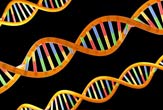Gene Linked to Tuberculosis Susceptibility Identified

Scientists have identified a gene that may provide clues as to why some people are more susceptible than others to the deadly disease tuberculosis.
The study was conducted by scanning more than 333,000 genes in more than 11,000 people living in Africa, and turned up one gene that was significantly associated with increased susceptibility to TB.
The research is different from other so-called genome-wide association studies (GWAS) in two key ways, the researchers say: It looked for a genetic link to an infectious disease, rather than an inherited disease or condition, and it was conducted in African populations. Previously, scientists believed the high degree of genetic diversity among Africans could prevent GWAS from turning up any meaningful data.
"We now know that we can use this approach of screening the entire genomes for differences between sick people and healthy people, and that we can find differences between these groups," said study researcher Rolf Horstmann, professor of molecular medicine at the Bernhard Nocht Institute for Tropical Medicine in Hamburg, Germany. "It has been done before in diseases like diabetes, but for infectious diseases, it proved to be difficult."
Only 10 percent of the world's population get sick with TB, which is caused by bacteria called Mycobacterium tuberculosis, after being exposed, Horstmann said. "So there was always the question of why 90 percent are protected. What's the difference between them?"
Scientists have criticized GWAS research because the individual genes that are found typically have a small impact on a person's risk for a disease. For example, each of a dozen gene variants has been found to be associated with an extremely small increased risk of type II diabetes. But together, these genes account for about 5 percent of the total risk.
But for tuberculosis, Horstmann said, genes that render people very susceptible to TB do not exist within the current human population because an individual having such a gene would have been likely to die from TB long before they were able to have children.
Get the world’s most fascinating discoveries delivered straight to your inbox.
The newly identified gene – called rs4331426 – is associated with only a very small increase in a person's risk of susceptibility to TB, and having this gene certainly doesn't cause a person to get TB, Horstmann said. However, this gene is likely to point the way to other genetic differences in susceptible people, and eventually, might lead to an understanding of the actual ways in which the bodies of susceptible people function differently from those who are resistant to TB. "We need to look around and see what else is in the same vicinity of this gene," Horstmann said. This gene is basically a marker that shows scientists where TB-susceptibility genes are likely to be found. The next steps will be to sequence the entire region of DNA found near this gene in people who are susceptible, and then to figure out what proteins are encoded by this region of genes and what those proteins do in cells, he said.
"These kinds of studies bring you to where the action is," said Dr. Hakon Hakonarson, director of the Center for Applied Genomics at The Children's Hospital of Philadelphia, who was not involved with the new work.
"Identifying genes that make people susceptible to TB would have a massive impact. It's an extremely important finding," Hakonarson said. He agreed with Horstmann's conclusion that the gene uncovered by the study is unlikely to cause susceptibility to TB itself, but is likely to lie in proximity to genes that do.
An estimated 1.3 million people died from tuberculosis in 2008, according to the World Health Organization. The highest number of deaths was in the Southeast Asia, while the highest mortality per capita was in the Africa.
The study was published online on Aug. 8 in the journal Nature Genetics.
- Top 10 Mysterious Diseases
- How Quickly Can Bacteria Multiply?
- 10 Deadly Diseases That Hopped Across Species

 Live Science Plus
Live Science Plus





